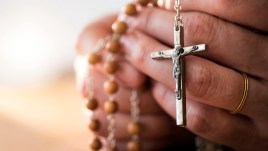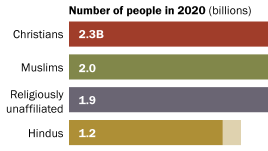
How religious is your state?
Explore our interactive database to find out how religious adults are in your state based on service attendance, prayer, belief in God, and importance of religion.
Numbers, Facts and Trends Shaping Your World
Explore our interactive database to find out how religious adults are in your state based on service attendance, prayer, belief in God, and importance of religion.
All
Publications
What does it mean to be Jewish in America? A new Pew Research Center survey looks into this diverse group.
See how your views on cultural engagement, synagogue attendance and perceptions of anti-Semitism compare with other Jews in the U.S.
Joe Biden is just the second Catholic president in U.S. history, after John F. Kennedy. Most U.S. adults know that Biden is Catholic, including majorities within both major political parties, according to a new Pew Research Center survey.
A new Pew Research Center survey finds that Americans are increasingly confident they can safely go to services at a church, temple, mosque or other house of worship.
Nearly half of U.S. adults are connected to Catholicism. Read about going to Mass, Communion, confession and more.
Christians remain the largest religious group, and Muslims grew the fastest from 2010 to 2020. Read how the global share of Buddhists, Hindus, Jews and the religiously unaffiliated changed.
After years of decline, the U.S. Christian share now shows signs of leveling off. The new Religious Landscape Study explores trends in identity, beliefs and practices.
The Global Religious Futures (GRF) project is jointly funded by The Pew Charitable Trusts and The John Templeton Foundation. Here are some big-picture findings from the GRF, together with context from other Pew Research Center studies.







